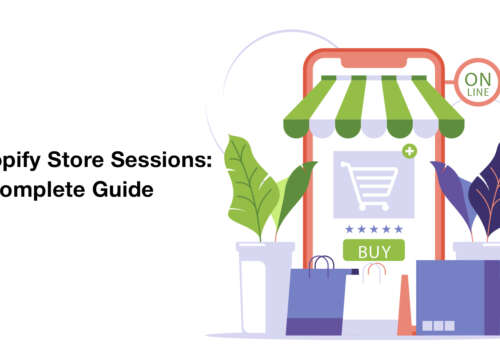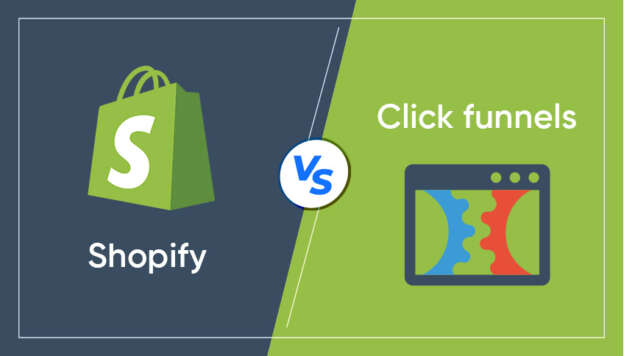It is obvious to get confused between Shopify vs Building your own website. Here is a blog that will help you to make the right decision.
Shopify vs Own Website: Which is an Ideal Investment?
Starting an online store can seem overwhelming, especially when deciding between using Shopify development or another platform. The aim is to consider a platform that could help create custom websites. Choosing Shopify Vs own website (custom built) platform will have their own set of advantages and challenges. This makes it essential to thoroughly evaluate each option before committing to one.
In this article, we’ll break down the key differences between Shopify and custom-built websites, highlighting their respective strengths and weaknesses to help you make an informed decision. Whether you’re looking for ease of use, scalability, customization, or specific features, understanding these factors is crucial in determining which path is right for your business.
Shopify vs Own Website: Key Differences
Shopify is an all-in-one eCommerce platform designed to streamline the process of creating an online store. It takes care of hosting and eliminates the need for coding, enabling you to quickly launch a fully operational website. With a wide range of built-in tools and features, Shopify helps you efficiently manage your products, sales, and marketing strategies.
In contrast, developing a custom website requires a thorough knowledge about the target audience. It needs you to equip your strategy with right marketing move, and website functionality as well. you also need to choose a hosting provider while ensuring several other important tasks are done on time.
Ecommerce Website Operational Costs
When comparing Shopify to running your own website, the operating costs differ significantly due to their distinct approaches.
Shopify
Shopify charges a monthly subscription, with several plans to choose from, and may also include additional transaction fees. There are potential extra costs for premium themes or specific apps that you want to use to enhance your store’s functionality.
Self-hosted website
On the other hand, creating your own website may involve a one-time expense for the platform, but you’ll need to cover ongoing costs like hosting (either monthly or annually), domain registration, SSL certificates for security, and possible expenses for themes or templates. Additionally, plugins and extensions may add to the total cost, along with developer fees if customization or professional help is needed.
Shopify offers three primary subscription plans tailored to different business sizes: Basic Shopify ($39), Shopify ($105), and Advanced Shopify ($399). One advantage of all Shopify plans is that they come with an included SSL certificate, eliminating the need for an additional purchase.
Plan Options
- Basic Shopify: $39/month
- Shopify: $105/month
- Advanced Shopify: $399/month
Transaction Fees vary depending on the plan and payment method used:
Basic Shopify: 2.9% + 30¢ for online sales, 2.6% + 10¢ for in-person sales, and 2% when using third-party payment providers.
Shopify: 2.7% + 30¢ online, 2.5% + 10¢ in person, and 1% for third-party providers.
Advanced Shopify: 2.5% + 30¢ online, 2.4% + 10¢ in person, and just 0.6% with third-party providers.
Additional App Costs can range from $0 to over $500, depending on the functionality you need, and Themes can be free or paid.
Total Estimated Costs
- Basic Shopify: $39-$541+ per month
- Shopify: $105-$606+ per month
- Advanced Shopify: $399-$900+ per month
Shopify
For businesses just starting, the Basic Shopify plan offers essential features like discount codes, unlimited storage, multi-channel integrations, and 24/7 support. As you upgrade to higher-tier plans like Shopify and Advanced Shopify, you unlock advanced analytics, reporting, and additional premium features, making these plans more suitable for businesses looking for more robust tools. The higher the plan, the greater the benefits and advanced features you receive.
Own Website
When opting for a custom-built website, you’ll need to cover the costs of nearly every feature individually. This includes purchasing a domain name, paying for web hosting, obtaining an SSL certificate, creating a custom design, integrating eCommerce plugins, setting up email marketing, and incorporating payment gateways, among other features.
Here’s an estimated cost breakdown for a custom-built website:
Cost Estimates:
Low-end estimate
– Platform: Free
– Hosting: $5-$20/month
– SSL: Free
– Theme/Template: Free
– Plugins/Extensions: Free
– Developer Fees: N/A
– Total: $150-$500
Mid-range estimate
– Platform: Free
– Hosting: $20-$100/month
– SSL: Free
– Theme/Template: $50-$100
– Plugins/Extensions: $100-$300
– Developer Fees: $500-$2,000
– Total: $1,000-$5,000
High-end estimate
– Platform: $500+
– Hosting: $80-$500+/month
– SSL: $100+/year
– Theme/Template: $200+
– Plugins/Extensions: $500+/year
– Developer Fees: $5,000+
-Total: $5,000-$10,000
Comparison: Shopify vs. Own Website
Shopify offers more predictable pricing with its subscription model, making it easier to budget for monthly costs. However, as you upgrade to higher plans and add premium apps, the total expenses can increase significantly.
On the other hand, building a custom website involves higher upfront costs for hosting, design, and development. Although a custom website allows for greater flexibility and control, it may incur unexpected expenses over time for maintenance and additional features. In the long run, operating a custom-built site could lead to unplanned costs as you scale and enhance the site’s functionality.
Ease of Use
Shopify
Starting a business with Shopify is much simpler compared to building a store from scratch. Shopify caters to all types of users, whether you’re an experienced eCommerce professional or completely new to online selling. You don’t need any technical expertise in web development to set up a fully operational online store within minutes.
Typically, before building a website, you need to decide on the features and tools your store will require. However, with Shopify, the process is streamlined. Once you create an account, Shopify will guide you by asking a few questions about your selling goals and objectives, then provide tailored suggestions to help you create a functional store quickly and efficiently.
Own Website
Building your own online store using a self-hosted platform requires more effort, including finding a web developer and choosing services like Bluehost or GoDaddy for hosting and domain registration.
The key challenge with a custom-built site is the need for coding expertise and technical skills. If you’re not familiar with web development, it’s best to hire a skilled developer or a professional team to handle the website setup for you.
In addition to building the site, you’ll need to install a content management system (CMS) to efficiently manage your blog and website content. It’s also advisable to add an eCommerce plugin to give your store the flexibility and functionality needed for online selling.
Design and Customization
Shopify
Shopify provides access to over 200 high-quality themes, with premium themes priced between $140 and $450. From my experience with Shopify over the years, these themes are not only visually appealing but also fully responsive, meeting the needs of virtually any online store owner. Each theme offers a unique set of features, though some adjustments may be necessary to meet specific business goals.
If you’re looking to enhance your store by adding custom elements or developing new features, Shopify’s Liquid templating language allows you to modify the site’s underlying code. This gives you the flexibility to tailor the design and functionality to better suit your brand and improve the customer experience.
Own Website
Building a custom website requires significantly more time and effort compared to platforms like Shopify, especially when it comes to finding the perfect theme or template for your design.
If you don’t have a dedicated web designer, you can still explore various theme marketplaces offering a wide range of responsive designs at more affordable prices than those in the Shopify Theme Store. The great advantage of a custom-built store is the limitless potential for customization. You can craft a truly unique site that reflects your brand’s identity.
However, when considering custom themes or templates, it is recommended to look for those with strong reviews and an active user base. While flexibility is a key benefit, your design should also align with your audience’s expectations and values for an optimal user experience.
eCommerce Features
Shopify
As a comprehensive eCommerce platform, Shopify equips sellers with a wide array of powerful features. Here are a couple of standout ones:
- Fraud Detection
Shopify’s fraud analysis helps merchants identify suspicious orders, minimizing the risk of chargebacks. It collects evidence that can be used to challenge any disputed transactions, offering peace of mind.
- Payment Gateway Options
Shopify supports multiple payment gateways, including Shopify Payments, which allows sellers to accept major credit cards like Visa and MasterCard. These options are PCI compliant, ensuring secure transactions. If merchants prefer to use external payment providers, they can do so, though additional transaction fees will apply.
Own Website
On the other hand, a custom-built eCommerce website development grants full control over every element of SEO, such as URL structure, meta tags, sitemap creation, robots.txt files, and server-side optimizations. This flexibility allows to implement sophisticated SEO strategies tailored to the unique needs of target audience.
However, this level of control comes with significant time and effort, as optimizing for SEO can be a labour-intensive process. It requires continuous updates to align with the latest best practices, which can be challenging. Additionally, navigating complex technical issues may necessitate consulting with an SEO expert, potentially leading to extra expenses.
Security
Shopify
When you opt for a hosted platform like Shopify, many concerns are alleviated. You won’t have to worry about much. Shopify manages all security measures seamlessly in the background. This means you can focus on growing your business without the constant stress of handling security protocols yourself. Shopify’s built-in security features ensure your online store remains protected, allowing you to concentrate on what really matters: delivering an exceptional experience to your customers.
Custom-Built Website
Conversely, securing a custom-built website requires a financial investment to establish your security infrastructure. Additionally, dealing with security issues can be frustrating, especially when unexpected problems occur that are difficult to diagnose. This often leads to time-consuming troubleshooting and potential delays in addressing vulnerabilities.
In Conclusion
A thorough comparison of Shopify vs own website will help you find a suitable option that matches perfectly with your requirement. Therefore, you need to have the complete understanding of the specific needs that your website asks for. This will serve as a critical decision upon which the success of your website will depend. Additionally, ecommerce website development services can also help to provide you the best assistance to choose the right platform for building your new eCommerce website.














